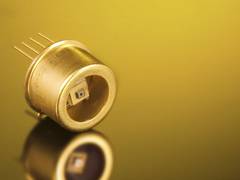Previous pages
Jump to navigation
Jump to search
Current goals
Obtain enough setup to measure a pulse from an APD. For example:
Setup
- "test" setup:
- photon source >> laser attenuator >> APD >> ADC >> Raspberry Pi
- control setup:
- photon source >> laser attenuator >> "Professional" SPCM >> ADC >> Raspberry Pi
Equipment needed
Semiconductor device:
May need a semiconductor fabrication facility with the ability to make thin films on Silicon.- A photodiode or APD to see how it performs.
Analog electronics:
- Circuit design to convert analog signal to digital signal.
Prebuild devices/hardware:
- laser source or photon source
- laser attenuator
- computer/Raspberry Pi for data processing
- Analog to Digital Converter (ADCs)
- "Professional" grade Single Photon Counting Module (SPCM) to characterize experimental setup.
- Fast oscilloscope.
tl;dr wishlist:
- Avalanche Photodiodes (need any 1)

A picture of an APD. SAP series - Laser Components SAP500 (passive)
- Perkin Elmer C30902SH (passive)
- Perkin Elmer SPCM-AQR-15 (active)
- MPD PD-050-CTD-FC (active)
- APD testing kit
- Laser source
- Photon attenuator
- Computer/Raspberry Pi for data processing
Potential Problems
- Dark noise may be overwhelming, so we may need to find a way to suppress it. (I suspect this is why commercial devices cost $2k-5k)
- Fabrication cost of the custom semiconductor device may be too high or impractical... gg.com (or we just refurbish an LED/solar panel, this will have lower PDE, but maybe we can use electronics to maximise the PDE.)
- Electronic circuitry costs. (Unlikely to be too costly)
![picture taken from [1]. This is the first goal to achieve before trying to improve](/images/thumb/7/7e/First_goal.png/300px-First_goal.png)
![a setup of APD kit, taken from [1]](/images/thumb/9/9a/Apd_testing_kit_setup.png/300px-Apd_testing_kit_setup.png)